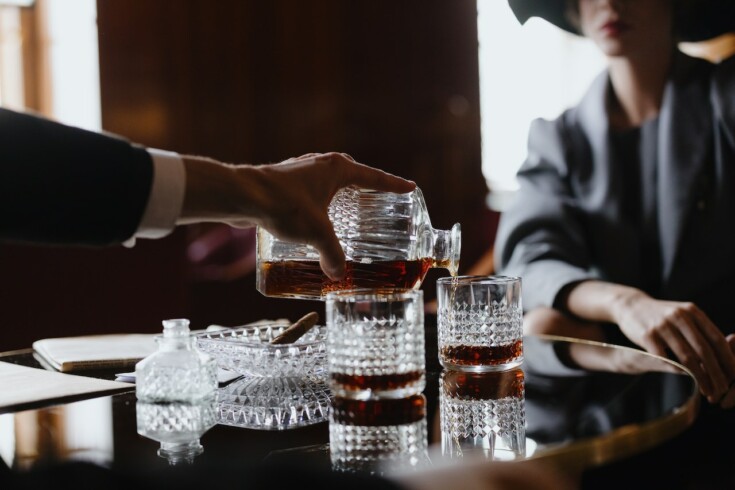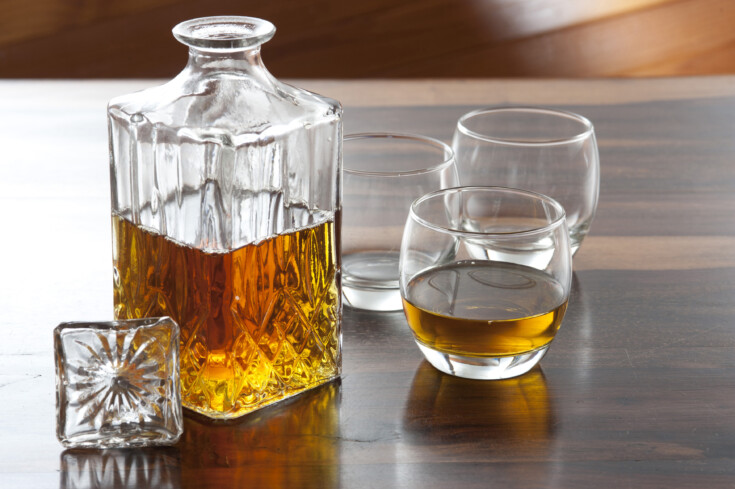
Whiskey is a beloved spirit enjoyed by many around the world. Whether you’re a seasoned whiskey connoisseur or a casual drinker, you may have wondered how long whiskey can last in a decanter. While decanters can be a beautiful addition to any home bar, it’s important to know how to properly store your whiskey to maintain its quality and flavor.
Knowing how long whiskey can last in a decanter is essential to ensuring you’re enjoying your whiskey at its best. In this article, we’ll explore the factors that affect the shelf life of whiskey in a decanter, how to properly store your whiskey, and the best types of decanters to use. Whether you’re a whiskey enthusiast or just looking to impress guests at your next dinner party, understanding the ins and outs of whiskey storage is key to enjoying this timeless spirit.
Table of Contents
Understanding Whiskey
Whiskey is a type of distilled alcoholic beverage made from fermented grain mash. It is typically aged in oak barrels and has a distinct flavor profile that can vary depending on factors such as the type of grain used, the aging process, and the region where it was produced.
One of the unique characteristics of whiskey is that it does not continue to age once it has been bottled. This means that a 12-year-old whiskey that was bottled in 2010 will still taste the same in 2023 as it did when it was first bottled. However, this does not mean that whiskey cannot change over time.
When whiskey is exposed to oxygen it can start to oxidize and change in flavor. This is why some people choose to decant their whiskey, or transfer it from the original bottle to a separate container. Decanting can help to improve the flavor and aroma of the whiskey by allowing it to breathe and reducing the presence of sediment.
It is important to note that not all whiskeys benefit from decanting, and some may actually lose flavor over time. Additionally, the length of time that whiskey can be stored in a decanter can vary depending on a number of factors, including the type of decanter used, the temperature and humidity of the storage location, and the alcohol content of the whiskey.
 photo credit: pxhere.com
photo credit: pxhere.com
Decanters and Their Purpose
Decanters are often used to store and serve whiskey. They come in various shapes and sizes and are made from different materials, such as glass, crystal, and lead-free crystal. The main purpose of a decanter is to provide an elegant way to serve whiskey while keeping it free from sediment and other impurities that may have settled in the bottle.
Decanters also allow for the aeration of whiskey, which can enhance its flavor and aroma. When whiskey is poured into a decanter, it is exposed to air, which can help to open up its flavors and aromas. This is especially true for younger whiskeys that may benefit from aeration.
However, it is important to note that not all whiskeys need to be decanted. Some whiskeys, such as single malts, are already filtered and do not contain sediment. In this case, decanting is not necessary and may even be detrimental to the whiskey’s flavor and aroma.
When using a decanter, it is important to only decant the amount of whiskey that will be consumed within a reasonable amount of time. Whiskey stored in a decanter can last between two months and three years, depending on various factors such as the amount of alcohol in the decanter, temperature fluctuations, humidity, and light. It is also important to ensure that the decanter has an airtight seal to prevent evaporation and maintain the whiskey’s quality.
Factors Affecting Whiskey in a Decanter
Air Exposure
One of the biggest factors affecting whiskey in a decanter is air exposure. When whiskey is exposed to air, it undergoes a process called oxidation, which can change its flavor and aroma. While some people believe that decanting whiskey can improve its taste, too much air exposure can cause it to go bad.
Temperature
Temperature is another important factor to consider when storing whiskey in a decanter. Whiskey should be kept at a consistent temperature, ideally between 55 and 65 degrees Fahrenheit. Fluctuations in temperature can cause the whiskey to expand and contract, which can affect its taste and aroma.
Light Exposure
Light exposure is another factor that can affect the shelf life of whiskey in a decanter. Exposure to light can cause the whiskey to break down and lose its flavor and aroma. To prevent this from happening, it is important to store the decanter in a dark place, away from direct sunlight.
Signs of Deterioration
Whiskey stored in a decanter can last for a few months to a couple of years, depending on various factors such as the decanter’s material, seal, temperature, humidity, and light exposure. However, even with the best storage conditions, whiskey can deteriorate over time. Here are some signs to look out for:
Changes in Color
If the whiskey’s color has changed significantly, it may indicate that the whiskey has deteriorated. Whiskey usually darkens with age, but if it becomes hazy or cloudy, it may be a sign of spoilage. If the whiskey has been exposed to too much light, it may have a yellow or brown tint, which can be an indication of oxidation.
Unpleasant Smell
Whiskey that has gone bad will have a distinct, unpleasant smell. The aroma of spoiled whiskey can range from musty to sour and can be an indication of bacterial growth or oxidation. If the whiskey has absorbed any odors from the decanter, it may also have an unpleasant smell.
Off-Flavors
Spoiled whiskey can have off-flavors that are not typical of the whiskey’s original taste. If the whiskey tastes sour, bitter, or metallic, it may have gone bad. The off-flavors can be a result of bacterial growth, oxidation, or contamination.
Sediment
If there is sediment in the whiskey, it may indicate that the whiskey has deteriorated. Sediment can be a result of bacterial growth or oxidation, which can cause the whiskey to break down and form particles.
Proper Storage of Whiskey in a Decanter
When it comes to storing whiskey in a decanter, there are a few things to keep in mind to ensure that the whiskey stays fresh and maintains its flavor. Here are some tips for proper storage of whiskey in a decanter:
Choose the Right Decanter
The first thing to consider when storing whiskey in a decanter is the type of decanter to use. It is important to choose a decanter made from lead-free crystal or glass. Lead crystal decanters can cause lead to leach into the whiskey, which can be harmful to human health.
Keep the Decanter in a Cool, Dark Place
Whiskey should be stored in a cool, dark place to prevent it from being exposed to light and heat, which can cause it to lose its flavor and aroma. It is best to store the decanter in a cabinet or closet away from direct sunlight.
Use an Airtight Seal
An airtight seal is essential for storing whiskey in a decanter. This will prevent air from getting into the decanter and oxidizing the whiskey, which can cause it to lose its flavor and aroma. Make sure that the decanter has a tight-fitting stopper or lid to keep the whiskey fresh.
Store for Up to Two Months
Whiskey stored in a decanter can last between two months and three years, depending on how much alcohol there is in the decanter. However, it is best to consume the whiskey within two months to ensure that it maintains its flavor and aroma.
Avoid Temperature Fluctuations and Humidity
Temperature fluctuations and humidity can also affect the flavor and aroma of whiskey stored in a decanter. It is best to store the decanter in a place where the temperature and humidity are consistent.
Frequently Asked Questions
How long can whiskey stay in a decanter without going bad?
Whiskey stored in a decanter can last between two months and three years, depending on how much alcohol there is in the lead-free decanter. However, it is important to note that whiskey does not age in the bottle, unlike wine. Therefore, it is recommended to consume the whiskey within a reasonable time frame to enjoy its full flavor.
What is the ideal storage condition for whiskey in a decanter?
Whiskey should be stored in a cool, dry place, away from direct sunlight, moisture, and fluctuating temperatures. Exposure to these elements can affect the quality and flavor of the whiskey. Therefore, it is recommended to store the decanter in a cabinet or a dark room with a constant temperature.
Does whiskey quality change when stored in a decanter?
Whiskey quality can change when stored in a decanter due to exposure to oxygen. Flavors may start to change once exposed to oxygen, but it is believed that decanting whiskey can improve the flavor and aroma of the whisky. However, it is important to consume the whiskey within a reasonable time frame to enjoy its full flavor.
What are the benefits of using a decanter for whiskey storage?
Decanting whiskey can help improve the flavor and aroma of the whisky. It can also enhance the visual appeal of the drink, making it an excellent display piece for entertaining guests. Additionally, decanters can help keep dust and other contaminants from entering the bottle.
How often should you clean a whiskey decanter?
It is recommended to clean a whiskey decanter after every use to prevent any residue from building up. To clean a decanter, rinse it with warm water and let it air dry. If there is any stubborn residue, use a soft-bristled brush to gently scrub the inside of the decanter.
What is the best material for a whiskey decanter?
Lead-free crystal glass is the best material for a whiskey decanter. It is durable, easy to clean, and does not affect the taste of the whiskey. Additionally, crystal glass decanters can enhance the visual appeal of the drink, making it an excellent display piece for entertaining guests.
Conclusion
Whiskey can last in a decanter for a considerable amount of time, depending on various factors such as the alcohol content of the whiskey, the type of decanter, and the environmental conditions.
Whiskey stored in a decanter can last between two months and three years, depending on the alcohol content of the whiskey and the type of decanter used. However, it is essential to note that the shelf life of whiskey can be affected by environmental factors such as temperature fluctuations, humidity, and light.
Related Posts
Here are some other articles related to whiskey that you might find interesting. These articles offer a range of insights and tips related to whiskey, from unusual products made from whiskey to myths about the drink. If you’re interested in learning more about whiskey, be sure to check them out:
- 3 of the weirdest whisky by-products: This article explores some unusual products made from whiskey, such as soap and candles.
- 3 Popular Whisky Myths Debunked #2: This article debunks some common myths about whiskey, such as the idea that older whiskey is always better.
- 5 Whisky Hotspots You Need To Visit While In London: If you’re planning a trip to London and you’re a whiskey lover, this article is a must-read. It highlights some of the best whiskey bars in the city.
- Rock your Christmas dinner with those Whisky & Food pairings: This article provides some suggestions for pairing whiskey with different types of food, which could come in handy if you’re planning a festive dinner.
- 3 popular whisky myths debunked: This is the first article in a series that debunks common myths about whiskey. It covers topics such as the idea that adding water to whiskey ruins it.



